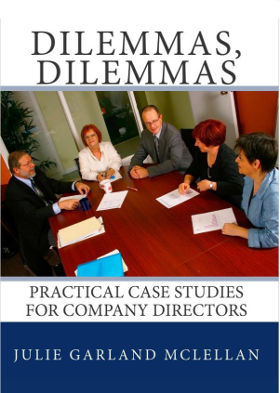Dear reader,
Welcome to the October 2015 edition of The Director’s Dilemma.
This month our case study investigates the contentious boundary between private and corporate life when a CEO makes personal choices which conflict with corporate culture. I hope you enjoy the dilemma and its suggested responses.
To read this email in your browser, go to www.mclellan.com.au/newsletter.html and click on 'read the latest issue'.
Ximena chairs a government utility business that operates large primary industrial processes and is also involved in construction of new assets. Safety is a key issue and the board have zero appetite for any physical harm to staff, contractors or innocent bystanders. As board Chair Ximena also chairs the remuneration committee and has recently incorporated some nominations work into the charter and activities to better support the government with their desire to involve boards in director succession planning.
The HR Director recently asked Ximena for a meeting at which she told Ximena that staff were concerned by the CEO’s activities outside of work. Specifically the CEO is involved in White Collar Boxing and the HR director feels this is not appropriate given the culture of the workplace and the visible support the organisation, and many other government companies, has given to anti-domestic violence campaigns. The HR Director also checked the terms of the company’s key man insurance policy and discovered that this would be voided for injuries or death resulting from action sports activities that include boxing. The HR Director has asked that Ximena talk to the CEO about ceasing his involvement with the sport.
Ximena is concerned but cautious. She knows that the CEO, who was brought in from commercial industry, and the HR Director, a long serving public sector employee, have often differed in their opinions and that, whilst both are professional, there is scant respect and less regard between them. But she has to admit that a boxing CEO might not sit well with the ‘A Fight is Never Right’ campaign the company has just sponsored.
Is this the CEO’s private business or an issue for the company and its board: What should Ximena do?




